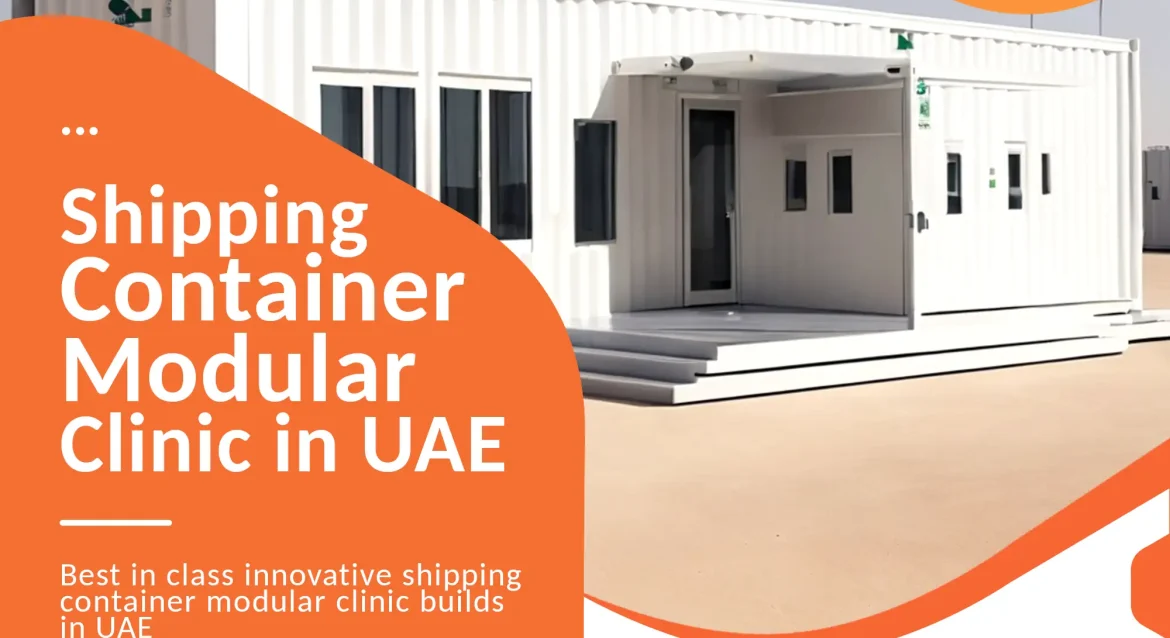Converting shipping containers into mobile clinics offers a versatile and cost-effective solution for delivering healthcare services in the UAE – United Arab Emirates . These innovative mobile clinics can reach underserved areas, respond to emergencies, and provide medical care in remote locations. In this article, we will discuss essential tips for converting shipping containers into mobile clinics in the UAE, including the container conversion process, the involvement of container fabrication companies, and the benefits of creating these mobile healthcare units.
Table of Contents
1. Assessing Healthcare Needs:
Before starting the conversion process, it is crucial to assess the specific healthcare needs and requirements of the target population. Identify the services that will be offered, such as general healthcare, dental care, or specialized medical services. Consider the equipment, technology, and infrastructure needed to support these services. This assessment will help determine the size and layout of the mobile clinic.
2. Selecting the Right Shipping Container:
Choose a suitable shipping container for the mobile clinic conversion. Consider factors such as size, condition, and structural integrity. High-quality containers made of durable materials, like Corten steel, are recommended. Collaborate with a reputable container fabrication company in the UAE to source containers that meet healthcare regulations and standards.
3. Layout and Design:
Designing an efficient and functional layout is crucial for a mobile clinic. Allocate space for reception, waiting areas, examination rooms, laboratory, pharmacy, and staff facilities. Consider ergonomic designs, accessibility for patients with disabilities, and infection control measures. Collaborate with healthcare professionals and experienced architects to optimize the space and ensure the clinic meets regulatory requirements.
4. Plumbing and Electrical Installations:
Plumbing and electrical systems are vital components of a mobile clinic. Work with experts to install plumbing for sinks, toilets, and medical equipment that require water supply. Ensure the electrical system can handle the power requirements of medical equipment, lighting, and HVAC systems. Collaborate with container fabrication companies experienced in healthcare conversions to ensure proper installations and compliance with safety standards.
5. HVAC and Insulation:
Proper insulation and HVAC systems are essential to maintain comfortable temperatures and ensure a sterile environment within the mobile clinic. Insulation helps regulate interior temperatures, protects medical equipment, and provides noise reduction. HVAC systems should provide adequate ventilation and filtration to maintain air quality. Collaborate with experts to select energy-efficient HVAC systems suitable for the mobile clinic’s size and requirements.
6. Medical Equipment and Furnishings:
Selecting the right medical equipment and furnishings is critical for the functionality and efficiency of the mobile clinic. Consider the specific healthcare services offered and equip the clinic accordingly. Collaborate with medical suppliers and equipment specialists to source appropriate and reliable medical equipment that meets regulatory standards. Choose furnishings that are comfortable for patients and ergonomic for healthcare professionals.
7. IT and Telecommunications:
Incorporate IT and telecommunication systems to support electronic health records, communication with other healthcare providers, and telemedicine capabilities. Install secure network infrastructure and ensure compliance with patient data privacy regulations. Collaborate with IT experts to design a reliable and efficient IT infrastructure that can support the mobile clinic’s connectivity needs.
8. Accessibility and Mobility:
Ensure the mobile clinic is designed for accessibility and mobility. Incorporate features such as ramps, wide doorways, and lifts to accommodate patients with disabilities. Consider the weight and size restrictions for transportation and collaborate with container fabrication companies experienced in mobile conversions to ensure the clinic is transportable to various locations across the UAE.
9. Compliance with Healthcare Regulations:
Complying with healthcare regulations and standards is crucial for the successful operation of a mobile clinic. Collaborate with healthcare consultants and regulatory bodies in the UAE to ensure the mobile clinic meets all necessary guidelines. This includes infection control protocols, medical waste management, storage and handling of medications, and compliance with licensing and accreditation requirements.
10. Maintenance and Safety:
Implement a maintenance and safety plan to ensure the longevity and safety of the mobile clinic. Regularly inspect the clinic for any wear and tear, and schedule maintenance checks for medical equipment. Train the clinic staff on safety protocols and emergency procedures. Collaborate with container fabrication companies that offer aftercare services to address any maintenance or safety concerns.
Converting shipping containers into mobile clinics presents an innovative solution to deliver healthcare services in the UAE. By following the essential tips outlined in this article and working closely with container fabrication companies experienced in healthcare conversions, mobile clinics can be transformed into efficient and accessible healthcare units. These mobile clinics can bridge the gap in healthcare accessibility, reach underserved populations, and provide essential medical services across the UAE. Embrace the potential of shipping container conversions and contribute to the advancement of healthcare delivery in the country. Looking to setup a shipping container based modular clinic in UAE or any where in middle East? feel free to contact Arabian containers. We are here to assist you 24×7.

